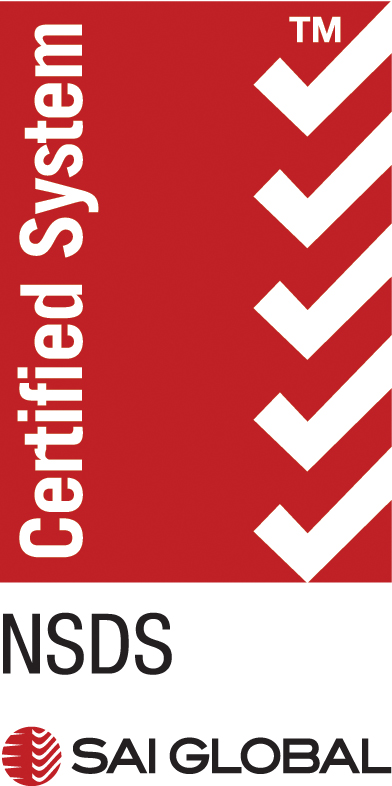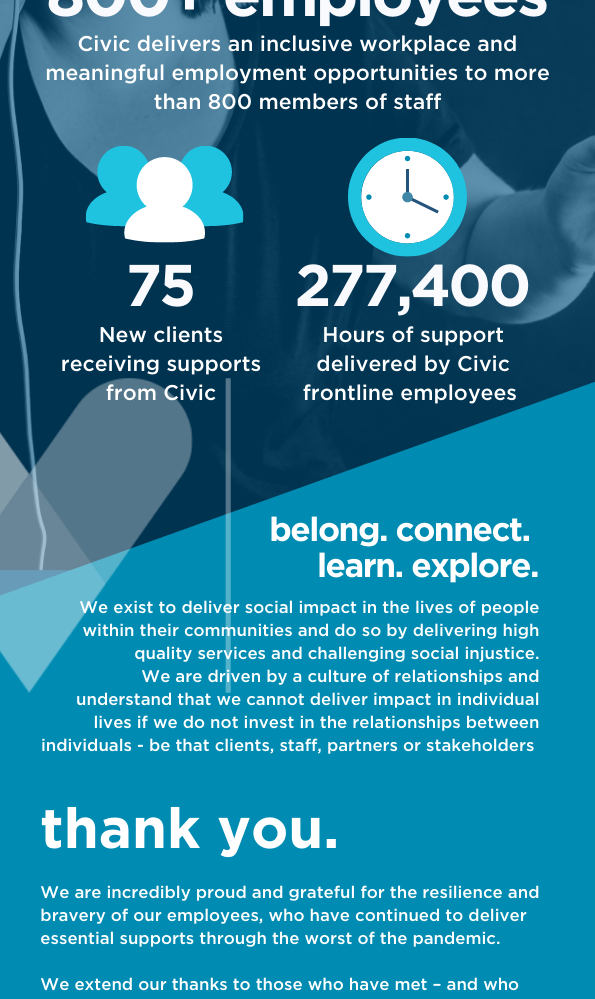
Dear All,
As we look back on the past year, it has been one again characterised by turbulence, uncertainty and a very real and ever present risk. There is no doubt that the ongoing COVID-19 pandemic has left its mark both on an organisational and individual level, and its impact will be felt long into the future. We are again incredibly proud and grateful for the resilience and bravery of our employees, who have continued to deliver essential supports through the worst of the pandemic; who have adjusted to new work environments, restrictions and regulations; who have put the safety of others ahead of their own; and who have supported our clients to achieve their goals against this backdrop. On behalf of the Board, we extend our thanks to those who have met – and who continue to meet – the unprecedented challenges of the pandemic head on.
It is not only our employees who have navigated the past 12 months with grace. We extend our heartfelt thanks to all clients, families and stakeholders who have supported us at every stage of the pandemic, even when separated from loved ones for weeks at a time. The pandemic has asked so much more from all of us – in our work and personal lives as well. We have learned, grown and adjusted and, as we move into the next phase of the pandemic – one that will continue to challenge the safe delivery of services – we believe we are a stronger organisation.
The Civic of today is very different to the one that was founded, almost 65 years ago, by a group of incredible parents in Sydney’s Sutherland Shire. But while we have grown, the heart and the roots of our organisation remain the same.
We exist to deliver social impact in the lives of people within their communities and do so by delivering high quality services and challenging social injustice. We have emerged as a passionate and innovative organisation, capable of breaking down barriers in pursuit of our mission – to drive change in individual lives and in our communities through the delivery of economic and social inclusion, life long education, stable housing and access to healthcare. We believe everyone has a right to a fulfilling and inclusive life and, over the past 12 months, we have supported in excess of 700 clients and 800 employees in achieving this goal.
While the pandemic has dominated life for the past 12 months, we look back on a year of achievements, many of which this report will highlight in more detail.
Our commitment to being a voice for change began in earnest in January, when 24 powerful portraits were hung in Hazelhurst Regional Arts Centre. The exhibition, entitled Illuminate, called on the thousands of people who visited during the school holidays, to question their perception of those with disability and shone a light on the people who are so often seen second to their disability. I am delighted that so many were able to attend this exhibition, and that it was complemented through the delivery of an online gallery, still available on our website.
The pandemic itself has highlighted many disparities suffered by those with disability in their everyday lives and to these, too, we have given our voice. Civic’s advocacy, this year, has highlighted issues in the roll out of the COVID-19 vaccination as well as both the federal and state government’s hesitancy to enforce vaccination mandates across the sector, while enforcing them readily across aged care. Civic has also campaigned for those residing in shared living, questioning the National Disability Insurance Agency in their ongoing price constraints.
Our impact, this year, has also been felt in our work campaigning for inclusive workplaces. While our own workplaces, including our Kitchen and Catering social enterprises and Civic Industries, have remained operational throughout the pandemic, we have also been able to partner with mainstream employers to promote the benefits of inclusive, accessible workplaces and support them in making the shift towards these environments.
Within our own workplace, our longstanding commitment to technology has reaped many benefits through the past 12 months. Civic’s people are now supported by a leading-edge, centralised Microsoft-based platform, realising Civic’s ambition of affording our front line workers more time to spend on what matters – building relationships with and supporting clients – and less time navigating cumbersome technology.
Technology is also at the fore of Civic’s innovative service offering. Our partnership with Psykinetic offers real potential for those with significant disabilities to be supported in a more meaningful way, and our ongoing partnership with Assistive Technology providers, Harvey Norman, has ensured all our services and clients are supported in their independence through technology.
In line with Civic’s commitment to grow our impact and provide solid financial foundations for the sustainability of our essential services, Civic has continued to extend our service offering over the past 12 months. In partnership with Summer Housing and Enliven, Civic is now supporting 60 individuals to live independently in apartments, many of whom have transitioned from residential aged care or from hospital. Our partnership with SGCH has also extended in 2021 to now support another five individuals, previously homeless, to access the NDIS and maintain tenancy within a new vertical complex in Redfern. Our Aged Care footprint has also expanded, with the provision of flexible respite across South East Sydney throughout the pandemic and the refurbishment of our Cottage Respite accommodation. Indeed, through 2020-21 we have welcomed 75 new clients across our services.
As we look to the year ahead, there is no doubt it will again call on us to show resilience as we strive to achieve our vision and mission. The ongoing impact of the pandemic will continue to be felt, and the maturation of the NDIS will no doubt continue to drive change across the sector. We look forward to supporting the continuing work of the Disability Royal Commission in reducing the incidents of violence, abuse, neglect and in driving improvements in the way individuals are supported by those they trust. And, most of all, we look forward to the many individual moments of success that we’ll be privileged and honoured to observe over the coming 12 months. In closing, we thank you for your continued support and hope you enjoy reading some of these moments from the past year.
Warm regards,
Dunstan de Souza, Annie Doyle
Dunstan De Souza, Chair of the Board and Annie Doyle, CEO
Please note, in line with our commitment to a sustainable future, our Annual Review 2020 is presented online. You can download a PDF version of our Annual Review 2021 by clicking here.

Treasurer’s Address
2021 has been another turbulent year for the world at large and for us here at Civic. Responding to COVID-19 has been extraordinarily challenging for our organisation due to the pace of change driven by Public Health orders, other regulatory requirements and community expectations.
The COVID-19 pandemic has directly impacted the cost to deliver service, with the need to accommodate segregation across our sites driving up service delivery costs. At the same time, strict protocols around sickness and close and casual contacts have led to higher rates of sick leave and an increase in overtime.
The increase in costs has been compounded by a cut back in funding across our Supported Independent Living (SIL) clients – a result of the NDIA pricing restructure introduced in July 2020. Given SIL funding comprises 70% of organisational revenue, Civic’s margins have decreased significantly.
Despite these factors, Civic has remained financially stable.
Revenue grew from $53.4m to $58m, marking a sixth straight year of significant growth. Whilst the growth wasn’t double digits as in previous years, it was achieved amid a turbulent environment. It is cause for note that, despite the lower grant funding, Civic has been able to keep costs down to enable a strong bottom line.
The Balance Sheet showed an operating surplus of $3m and Net Assets now stand at $39.5m (a 30% increase), following the property revaluation adding $6m, as well as the purchase of the property on Kingsway.
Once again, innovation featured highly this year, with online service delivery and the furthering of our exploration into Artificial Intelligence. Staff have used their imagination to support clients in their homes and workplace to enable the delivery of meals and hampers; grants have been applied to enable opportunities in the property space as well; and we look forward to that development in 2022.
It is wonderful to know that the dedication of the Civic team has enabled the success we have seen and with the support of our funding bodies and commercial customers we have remained in a strong position to continue to support the clients in our care. I would like to thank all our supporters for helping to make 2021 another strong year.
Michael Coughtrey, BBus, LLB, CA
TreasurerClick here to view or download Civic’s Financial Statement.
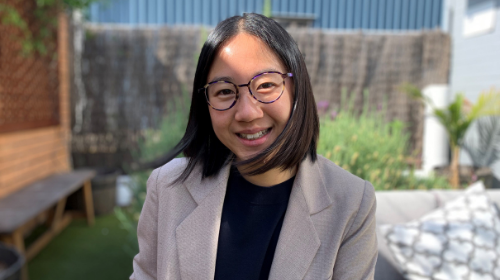
Welcome to our new Board Members
This year we welcomed a new Company Secretary to the Board.
Company Secretary, Katherine Sieu Kay Lau, BA, JD (Distinction), GDLP
Appointed as Company Secretary in July 2021, Katherine brings her legal training and experience in private practice into the role. Katherine is a lawyer, with over 4 years’ experience practising in areas of corporate and commercial, banking and financial services and property law.

Our People
2021 has been another turbulent year for the world at large and for us here at Civic. Responding to COVID-19 has been extraordinarily challenging for our organisation due to the pace of change driven by Public Health orders, other regulatory requirements and community expectations.
Our three-year strategy recognises that it is only through supporting our workforce to thrive that our vision and mission can be achieved. Over the past 12 months, we have therefore been nurturing an organisational culture that embraces our workforce in the pursuit of our mission – encouraging and fostering the relationships between individuals that allow them to thrive in their roles, while providing the support and structures to encourage learning, sharing and development. At the same time, external pressures on our workforce had never been so great. Our frontline team were required to deliver supports in the face of a deadly virus; our head office workforce were distanced from each other, with many juggling the dual responsibilities of home schooling and work; and we all faced separation from our usual support networks.
Through these challenges, however, Civic has remained true to its intention to engage staff in understanding what matters most to them – investing in projects, processes and changes that have the most impact on their engagement and experience at Civic.
The establishment of Civic’s 1% Improvement Movement has pioneered this approach, bringing grassroots ideas from Civic’s workforce to fruition – with each idea designed to make an incremental improvement in work life. Designed to support staff in voicing and developing their ideas, the 1% Improvements Group comprises individuals from around the organisation, all of whom share a passion for driving change. Since establishing the Group in early 2021, the Group have overseen the launch of a lunch and learn information sharing series designed for practice leaders and support workers; and the development of a new Program of Support for clients to brush up on their cooking skills.
Delivering a staff experience in line with our value of ‘belong’ has also been a key priority and, through Stay-at-Home Orders, Civic’s all staff ‘Morning Teas’ have become an opportunity to connect, learn and relax for a short while every few weeks. Bringing all staff and clients together for half an hour, our online morning teas place focus on our front line workers and provide another opportunity to hear from and be inspired by our workforce.
Civic’s online learning platform, Learn @ Civic, and established staff onboarding program, Fresh Start, have been continually improved through the past 12 months and now provide a rich resource for both new and existing staff members. Combined with our investment in technology, simplified systems and streamlined processes, our workforce today are valued and supported in the work they do.
Covid-19
While Australia has been shielded from the very worst impacts of the Global Pandemic – which emerged so soon after the Bush Fire emergencies of 2019 – COVID-19 continued to drive the agenda for much of the 2020-21 period and its impact will be felt well into the future.
Stay at Home orders impacted regions of Sydney, New South Wales (NSW), through December 2020 and into the New Year, and the roll out of the vaccine, which began in late February 2021 under Phase 1A, demanded much from our teams and our clients while again exposing a profound lack of understanding from Government Bodies regarding the complexities and nuances of disability service provision.
Later in the year, the emergence of the Delta Variant across NSW tested the robustness of all providers’ pandemic management plans, placing Risk Management at the fore and leaving an ever present threat for those delivering essential supports to some of the most vulnerable individuals in Australia. Civic’s people – our clients, employees, their families and the communities in which we work – have responded throughout the turbulence of the pandemic with courage and resilience.
It is testament to this resilience that, through the pandemic, Civic has never faltered in the delivery of essential supports. While some of our services have been interrupted, Civic’s online platform, Civic @ Home, supported by our partners, has supported clients to stay social and active in the home with both live and on-demand classes available. Our operational team has shown determination in supporting clients to achieve important outcomes, regardless of the environment in which they find themselves, with many staff shifting from their usual place of employment to support clients in the home.
Throughout the pandemic, Civic has kept the health and safety of its clients and employees front of mind and, while responding in line with Public Health Orders, Civic has also acted in keeping with its own pandemic management plan. Against a backdrop that includes a Royal Commission into the treatment of individuals living with disability, we have observed a failure to prioritise or often consider, those living with disability and their living environments, as well as a lack of clarity and advice for providing essential supports. As an organisation, we have chosen to use our platform and speak up. We called on the Prime Minister to prioritise the health and safety of our communities by mandating the COVID-19 vaccine across the sector, which had been overlooked in legislation. We spoke up when the Government failed to deliver the vaccine to our clients under Phase 1A of the vaccine roll out, and took matters into our own hands to organise life saving vaccination appointments for our clients. We will continue to speak up and advocate for those we support and, as the pandemic continues through into 2022 and perhaps beyond, we will always prioritise the health and safety of those we are entrusted to support.
Strategic Update
The 2020-21 period saw the launch of Civic’s new three-year strategy. Looking further ahead than we have before, Civic undertook months of research, user experience interviews and workshops to reimagine Civic’s mission, underpinned by a Theory of Change, which would drive the strategic goals of the organisation. Launched in December 2020, Civic has now taken its first steps towards the realisation of its strategy, due for completion in 2023.
Established for more than 61 years, the most recent period in the organisation’s history has been one of extraordinary change, adapting to the creation, establishment and rapid maturity of the National Disability insurance Scheme (NDIS), which itself radically transformed the way in which disability services are delivered and perceived within the community. At the same time, Civic has matured significantly, growing in size, reach, services and expertise.
Set against this context, it was important for Civic to reconsider its aspirations as an organisation and, in collaboration with our clients and employees, define the impact we wish to have moving forwards.
While Civic’s longstanding vision – that of human potential, realised – remains true, it became clear through the gathering of meaningful insights from our clients, partners and staff, that our corporate mission and values needed to change to better support Civic in achieving its future goals as defined in our three year strategy.
Civic’s mission – to challenge the status quo by thinking differently and driving change in individual lives and the community through economic and social inclusion, life-long education, stable tenure and health access – now guides us in delivering social impact to those who experience social injustice in our communities. Our updated values – explore, belong, connect and learn – are authentic to the organisation and our people, chosen by our employees, clients and partners, and provide a set of guiding principles that shape our behaviour and decision making as we strive towards our mission.
Launched in December 2020, Civic’s three-year strategy identified three long term goals: to proudly know the social impact we create and be a voice for change; to deliver meaningful market differentiation through a culture of relationship driven services; and to embed a lean, agile and tech-enabled operating model. Alongside Civic’s financial targets, designed to ensure organisational sustainability and the reinvestment of profit into impact activities, Civic has worked through the 20-21 financial year to lay the foundations of success in achieving this strategy.

The National Disability Insurance Scheme (NDIS)
The 2020-21 financial year presented a number of challenges to those operating within the National Disability Insurance Scheme (NDIS) with Participants anxious over the Federal Government’s proposed use of Independent Assessments and frequent media coverage calling into question the sustainability of the Scheme following escalating costs.
As a provider operating within the NDIS, Civic has been required to support clients and their support partners in navigating a new pricing structure rolled out across group supports, including Shared Living arrangements, Supports in Employment and Centre- and Community-based supports and in understanding new services such as Individual Living Options. At the same time, Civic and other providers like us have had to balance the continuing provision of high quality support services with the constrictions placed by the NDIS Cost Model. The pricing structure had a significant and immediate impact on Supported Independent Living, with some clients seeing a drop in home and living support funding of up to 50%.

Civic has been vocal in challenging the decisions of the NIDS and, in a letter to Martin Hoffman, NDIS CEO, called into question the decision to cut funding from those who utilise it most – those living in shared living environments. Civic has participated in a number of NDIS consultations throughout the financial year, including the Home and Living and SIL Pricing consultations. Looking ahead, Civic is participating in the NDIS’s Annual Pricing Review and will continue to support clients and their support partners in both understanding and navigating the ever-changing funding environment.
Our Impact – Homelessness
Anyone can be affected by homelessness. However, some people, including those with disability, may have additional risk factors that increase their likelihood of experiencing homelessness, or that provide additional barriers to exiting homelessness.
Around 1 in 12 people who use specialist homelessness services have a disability, with those who have a disability generally having higher and more complex need for support than those without disability.
To address this issue and support those using homeless support services to find and sustain tenancy, Civic Disability Services partnered with social housing provider, St George Community Housing (SGCH). The ‘My Home Project’ was established as a pilot in 2020, before being extended to a second site in 2021.
The project supports individuals with disability to firstly access social housing, allocating five apartments to individuals with disability. It then combines ongoing support through the provision of on-site, tailored, 1:1 support, offering those at risk of homelessness the support they need to maintain tenancy.
Each support service is tailored to each tenant’s needs and home and living goals, including community outings, shopping, meal preparation and domestic skills-building.
This 1:1 active capacity building support, along with the cooperative and organised approach of the partners is the key difference in achieving high success in stable tenancy outcomes when compared with unsupported counterparts.
To date, the project has supported 10 individuals at risk of homelessness to access housing and maintain their tenancies.
Our Impact – Older Australians
In line with our organisational mission, Civic is continuing to expand its services for older Australians – both those living with disability and those receiving support under My Aged Care.
With the temporary suspension of Cottage Respite Services through the pandemic, Civic mobilised a flexible respite team, supporting older Australians in South East Sydney to receive supports in the home and access the community safely.
As we enter the next stage of the pandemic, however, and with services resuming, Civic’s Cottage Respite has been refurbished and now offers a warm and welcoming haven for older Australians in need of short term accommodation.
With as many as 97,000 elderly people waiting for a Home Care package to be assigned, Civic will aim to expand our Aged Care Services to Home Care Service provision in 21-22, drawing on our considerable experience to support Australians to live and age independently in their homes.
Under our Disability arm, Civic also supports an ageing population and, over the past 12 months, we have developed a model for ageing clients to ensure access to the clinical supports required by individuals. Our Clinical Governance Framework and established in-house clinical team ensure a wrap-around, preventative healthcare approach, while ensuring connection to the supports needed by those who are ageing.
Our Impact – Inclusive Employment Opportunities
Underpinning Civic’s mission is our drive to raise awareness of and break down the barriers that create harsh inequalities between Australians. Perhaps nowhere are these inequalities more evident than in the economic opportunities for those living with disability. In 2020 in Australia, over 4.4 million people have a disability, and the difference in life outcomes remains stark, with just 48% of working age people with disability holding a job, compared to 80% without disability. Sadly, Australia ranks lowest among OECD countries for relative income for people with disability, with a high reliance on the Disability Support Pension placing strain on household budgets and contributing to housing instability. Ultimately, people with disability are more likely to experience poverty, live in poor quality or insecure housing, have low levels of education, be socially isolated and have fewer opportunities for community life.
There are many and complex avenues to improve economic inclusion – and therefore health and wellbeing as well as housing outcomes – in Australia. Central to this is the provision of meaningful employment opportunities for those living with disability.
Over the past 12 months, Civic has established important partnerships outside the disability services sector, mentoring mainstream employers to firstly understand the barriers to inclusive employment, and secondly to support them in providing mainstream employment opportunities for individuals living with disability. Our award winning Civic Crew model has continued to support individuals in securing employment in mainstream environments, providing critical support to employers and equipping them to extend this impact wider. As we look ahead to the next 12 months, we are excited to extend this consultative approach, with clients themselves leading the drive to educate employers on the importance of sustainable employment opportunities on social outcomes for those with disability.
Both Civic Kitchen and Catering and Civic Industries have also continued to thrive, offering a socially welcoming environment for individuals to progress their careers and learn valuable skills that they can utilise in the future. Despite service restrictions through the COVID-19 pandemic, Civic Kitchen and Catering has engineered new catering opportunities, developing a successful hamper and meal delivery service, and Civic Industries has supported NSW Health in the packing and delivery of face masks and PPE, as well as the continuation of the Baby Bundles through 2020-21.

Our Impact – Illuminate
Earlier in the year, Civic hosted Illuminate, an inspiring exhibition at Hazelhurst Arts Centre, showcasing the powerful stories of 22 members of the Civic family.
The collective works, featuring photographs by Kylie Myth looks past disability, shining a light, instead, on true human potential.
The focus of the exhibition was to celebrate confidence, with a view to challenging pre-conceived ideas while creating an opportunity to relate and connect. Through these powerful photographs and accompanying stories, Illuminate tells the unique achievements of 22 individuals of all abilities, capturing an informal portrait of them at their most confident, at ease in their ability, demonstrating their power, strength and mastery.

As a fully accessible exhibition, each portrait was accompanied by a personal story, which could be listened to via an audio recording or read as a text.
Supported by Sutherland Shire Council, Illuminate was displayed at Hazelhurst’s Broadhurst Gallery, from 23 January to 2nd February 2021. You can view the exhibition here.
Our Impact – Damien’s Story
Damien applied to be considered for the Miller pilot through his support contacts in a homelessness crisis outreach. Ravaged by the effects of Huntington’s disease and a psychotic mental health disorder, Damien had been riding the carousel of homelessness for a significant period of time. He was separated from his daughters and son due to the instabilities associated with his homelessness and after spiralling out of control, Damien accessed crisis outreach organisations, seeking ways to restore his life back to stability and get his family back.
Under the Miller Pilot, Damien was supported to access Housing Pathways, and put supports in place to assist him to transition into his own apartment, using community partners who donated goods and released start-up funds to furnish his unit. The Civic team worked closely with Damien’s outreach contacts to build the trust and rapport so often required to engage people struggling with mental health to achieve the daunting task of establishing themselves in their own house.
As Damien allowed the Civic team into his life, and accepted the opportunity SGCH afforded him, he grew in pride and confidence in his new-found stability and independence. The confidence spurred him on to petition FACS to re-grant him supervised visitation access to his daughters in a neutral setting, a petition he eventually won in time for Christmas. This outcome was beyond what anyone involved in the Miller pilot could ever have hoped for, but it was a welcome illustration of the immense restorative power that stable housing and capacity building support can bring forth.
The next chapter in Damien’s moving story was the moment he was reunited with his son whom he had not had contact with for 9 years. The elation Damien felt had so many layers, love, pride, and redemption to name a few.
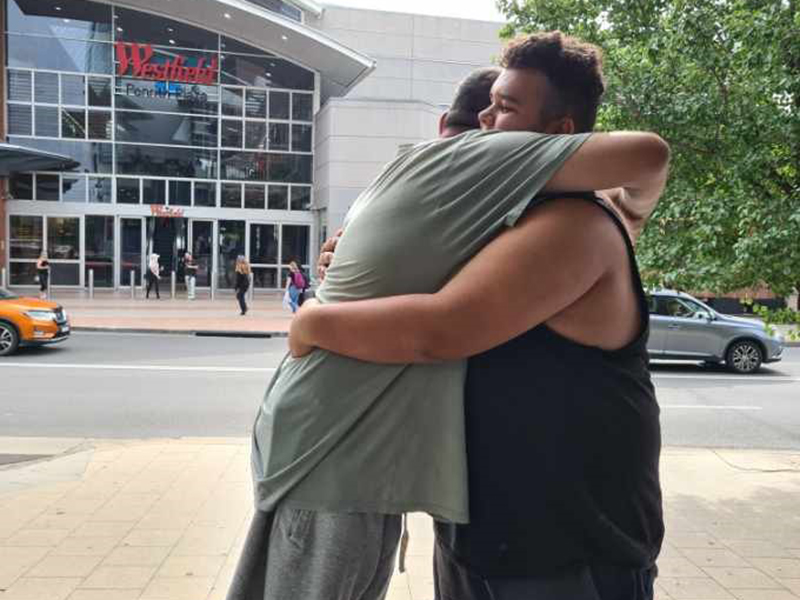
As of the first week of April 2021, Damien met with FACS at his Miller apartment where an assessment was conducted to determine if his accommodation and living circumstances were appropriate for him to be given ‘unsupervised access to his daughters’.
Damien passed with flying colours. At the submission of this report Damien is currently hosting his children in his own apartment in an unsupervised capacity.

Our Impact – Technology
Technology has been at the fore through the past 12 months – not only in the delivery of a centralised service platform, designed to deliver our employees with a streamlined and efficient business management platform, affording them more time to deliver high quality services and develop all important relationships in service provision, but also in our recognition of the role technology can play in the future delivery of services.
Nowhere is this more evident than in our partnership with inclusive technology pioneers, Psykinetic. A social business founded in 2014 by Dr Jordan Nguyen, Psykinetic have pioneered inclusive tech, with their work spanning biomedical technology, artificial intelligence, virtual-, mixed- and augmented-reality, robotics and more – all designed to create inclusive environments for individuals and groups.
Aligned in mission, Civic and Pyskinetic have this year formalised their partnership, working together across cutting edge research, investigating the scope for artificial intelligence to improve the delivery of supports for those with significant disabilities. Twelve months on and Civic and Psykinetic now have a body of evidence to support the build and delivery of a truly cutting edge technological solution that has the potential to deliver impact across the lives of not only individuals living with disability, but those who support them, as well.
While our partnership with Psykinetic presents an exciting future, it is not Civic’s only investment in technology through the past financial year. Civic has continued to partner with Assistive Technology provider, Harvey Norman, to equip our home and living environments with tech solutions tailored to individual needs and drive independence.
Recognising that our employees need robust, efficient systems and processes to support them in the ongoing delivery of exceptional services, our partnership with Microsoft has this year delivered an Accessible Cloud solution spanning Civic’s intake, feedback, incidents and complaints handling and service delivery functions. Replacing six separate systems with a single system and allowing our valued team of disability and aged care support workers to spend more time with clients and less time with computers, the transformation provides anywhere, anytime access to authorised users and a single view of the customer to all Civic staff.
As a key pillar in Civic’s three year strategy, there is no doubt technology will continue to drive service delivery improvements through the year ahead, as well as operational efficiencies, equipping Civic to meet its sustainable objectives.
Accreditations and Memberships
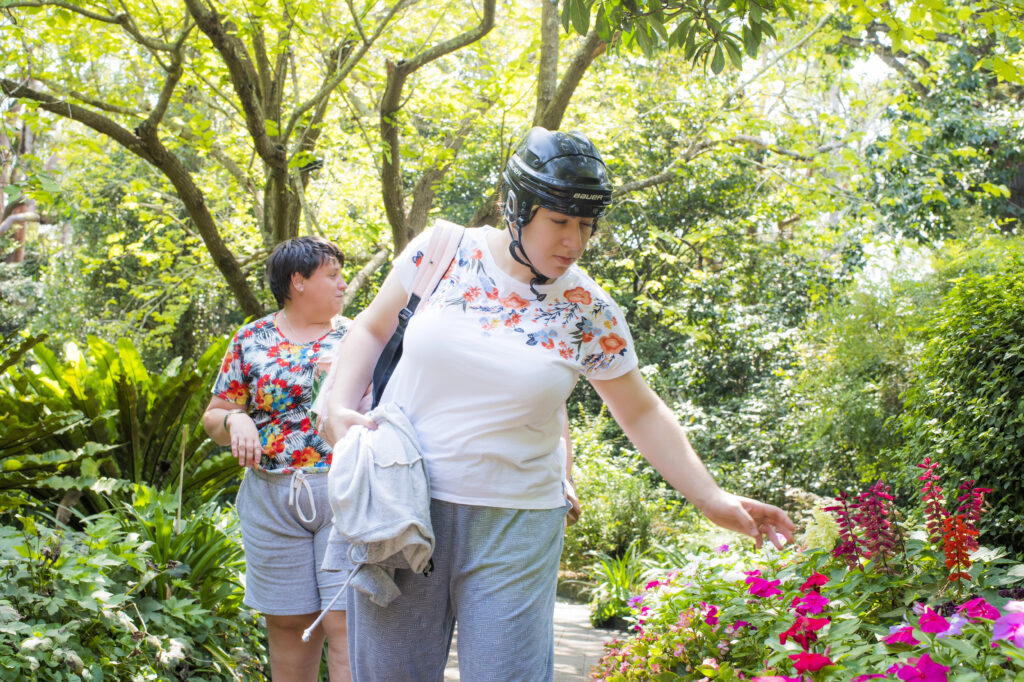
As a Registered Charity, we follow best practice guidelines and abide by the requirements of the Charitable Fundraising Act 1991 and Lotteries and Art Unions Act 1901. Our independently audited accounts also ensure our accountability to our donors and the community.
Civic’s policies and procedures reflect our commitment to creating quality services that are valued by clients and provide an environment where the health, safety and welfare of clients and staff is paramount. They also reflect Civic’s Vision, Mission and Values.
Civic’s Board, Management and Staff are committed to quality through sound governance and management across all aspects of our organisation.
External and internal audits are integral components of our quality management system, which is accredited to international standard ISO 9001:2015.
We make effective use of standards and related compliance activities to inform good practice and improvements in services.
Civic is a registered NDIS provider, and has met the NDIS Practice Standards, Quality Indicators.
Civic complies with the Aged Care Quality Standards and with the Attendant Care Standards. We are also a registered provider for the Voluntary Out-of-Home Care for Children and Young People and a Registered Community Housing Provider.
Civic Industries is an Australian Disability Enterprise as well as Social Traders certified.
Finally, we would like to extend our sincere thanks to those who have continued to support and guide us through the past year.
We acknowledge all the individuals, organisations, trusts, corporates and foundations who have shown their faith in our vision and mission.
We also thank and acknowledge each of our members of staff whose work has such an impact on the lives of people living with disability, and the members of our Board, who generously commit their time and expertise to the stewardship of our organisation.

Civic Disability Services


